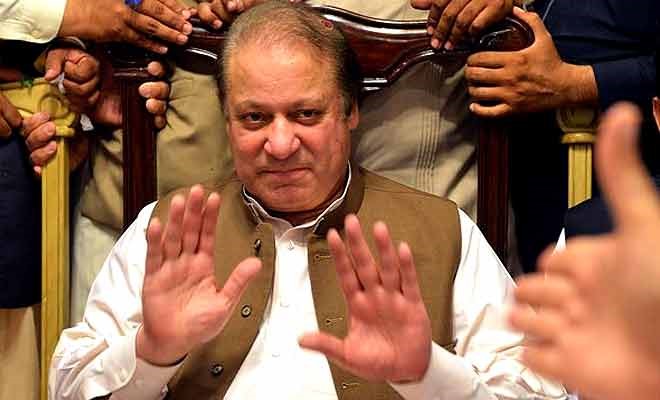 One person who will be most worried by the outcome of the historic Pakistan elections held on Saturday is former dictator General (retd) Pervez Musharraf. For the man now cooling his heels in a ‘sub-jail’ (a couple of rooms in his mansion outside Islamabad), the definite victory of the Pakistan Muslim League (N) and the return of Nawaz Sharif to the helm of power is the starkest message yet of his complete political redundancy, even failure.
One person who will be most worried by the outcome of the historic Pakistan elections held on Saturday is former dictator General (retd) Pervez Musharraf. For the man now cooling his heels in a ‘sub-jail’ (a couple of rooms in his mansion outside Islamabad), the definite victory of the Pakistan Muslim League (N) and the return of Nawaz Sharif to the helm of power is the starkest message yet of his complete political redundancy, even failure.
Nawaz Sharif’s “tajurba” or ‘experience’ appears to have decisively won the day for the steel industrialist and business magnate who served twice earlier as Prime Minister, from November 1990 to July 1993 and from February 1997 until he was ousted in a military coup (by Musharraf) in October 1999. He took on and overcame the challenge of the former cricket icon Imran Khan’s Tehreek-e-Insaaf party and resoundingly defeated the incumbent Pakistan People’s Party alliance and has emerged a clear winner.
Most important, for the country, is the fact that the average Pakistani has come out in strength and voted despite the ever-present, real threat of being thwarted by terrorists. With anything between 60 and 80 per cent of Pakistanis turning up at polling booths and waiting to cast their ballot, almost cocking a snook at the likes of Hakimullah Mehsud who issued a dire threat even a day before the polls, this election sends out a clear message that Pakistanis want peace and development.
The Indian government has welcomed Nawaz Sharif’s return to power, with External Affairs Minister Salman Khurshid saying that a clear result in a democratic election would be beneficial to bilateral ties.
On his part, Sharif has been saying all the right things as far as India is concerned, insisting that he will “pick up from where I left off in 1999” when, along with former Indian Prime Minister Atal Bihari Vajpayee, signed the Lahore Declaration, charting a peaceful course ahead. He has said restoring peaceful ties with India is a priority for him.
However, the Indian establishment, while welcoming the verdict of a democratic change in Islamabad, will continue to tread cautiously, given their experience of previous Sharif regimes. The man who has clearly stated that the Pakistani army will be answerable to the political executive and legislature began his career as a protégé of former Pakistani dictator General Zia-ul-Haq, widely reviled as the man who ‘talibanised’ the Pakistani army and formalised the use of ‘non-state actors’ or terrorists as instruments of state policy to “bleed” India. He also promptly followed India’s nuclear tests in May 1998 with tit-for-tat tests within a month, and the memory of Pakistani troop intrusions into Kargil shortly after the Lahore Declaration is a vivid memory.
Given his bitter experiences with the army subsequently, when he was ousted in a coup after the army chief Pervez Musharraf seized power in October 1999, Nawaz Sharif is likely to have evolved in his views and siding with the army’s use of “non-state-actors” may not be an option. Sharif was then arrested and eventually sentenced to life imprisonment on charges of hijacking and terrorism. For a man who was also convicted of corruption and banned for life by the army from political activities and exiled from his homeland, his return as the unchallenged leader of Pakistan today will be particularly sweet.
An alleged deal, brokered by Saudi Arabia, saved him and other family members from being put behind bars. Sharif, along with 40 members of his family,were exiled to Saudi Arabia for a period of 10 years, but his political wilderness ended with his triumphal return to Pakistan in 2007. Since the assassination of PPP leader Benazir Bhutto, Nawaz Sharif has been the pre-eminent political figure in Pakistan.
Having come to power on the promise of development and ending the crippling power crisis (18 hour long power cuts across the board) and getting the economy on the rails Sharif, the owner of the Ittefaq group, will have to deliver on the economic front in order to gain the authority to tackle the other, equally crippling issue of security and restoring law and order.
As the US-led ISAF forces prepare to leave Afghanistan next year, regional security, restoring law and order particularly in cities like Karachi and dealing with radicalisation of the army will become priorities for Nawaz Sharif, and peace with India will help him on that front.
According to former Indian High Commissioner to Pakistan, G Parthasarathy, while welcoming the election, India must temper its expectations of what Sharif can achieve.
Nilova Roy Chaudhury is Editor-in-Chief of the Indian Review of Global Affairs